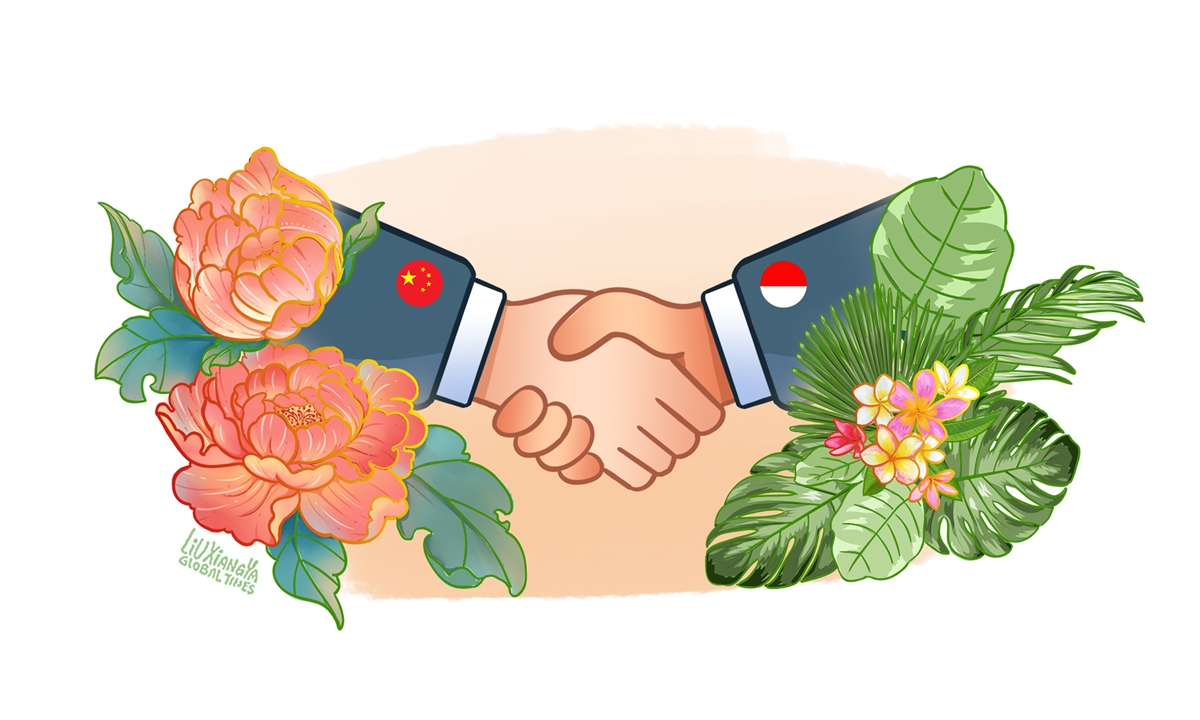
Illustration: Liu Xiangya/GT
On Monday, Beijing hosted the First Ministerial Meeting of China-Indonesia Joint Foreign and Defense Ministerial Dialogue. This proactive step marks a new phase in China-Indonesia ties, elevating their relationship to a more comprehensive and strategic level, and reassuring the audience about the region's security. Notably, this is the first "2+2" ministerial mechanism China established with a regional partner in Asia.
Establishing this mechanism aligns seamlessly with China's long-standing support for ASEAN's strategic autonomy. President Xi Jinping's recent visit to three ASEAN countries further highlighted China's commitment to deepening cooperation with the bloc.
Throughout these visits, President Xi emphasized that China firmly supports ASEAN unity and community-building, and supports ASEAN centrality in the regional architecture. The launch of the China-Indonesia "2+2" mechanism puts this diplomatic principle into concrete practice. As the two countries mark the 75th anniversary of diplomatic ties, upgrading to a high-level dialogue platform reflects their shared aspiration to foster deeper strategic trust.
Although China and ASEAN member states have developed various ministerial cooperation mechanisms over the years, this particular format - centering on high-level dialogue for foreign and defense affairs led by ministers from both sides - is unprecedented.
The formation of this new mechanism was no coincidence. In 2023, during the visit of former Indonesian President Joko Widodo to China, the two heads of state reached an important consensus to launch the "2+2" platform as the cornerstone of the two countries' broader strategic partnership and improve communication channels.
Beyond enhancing traditional cooperation, the new mechanism places security dialogue as one of the main topics of bilateral exchanges. This proactive response to a more complex regional landscape is a pragmatic approach to safeguarding national and regional strategic interests.
In recent years, Washington's "Indo-Pacific Strategy" has sought to reshape the region's order by forming exclusive security blocs and pushing regional countries to take sides, often heightening tensions. By manufacturing confrontation and bloc politics, the US' approach not only runs counter to the interests of states seeking peace and autonomous cooperation but also directly harms ASEAN's centrality as the center of the region's development.
In this context, the China-Indonesia "2+2" Ministerial Dialogue emerges as the mechanism establishes an institutionalized platform for high-level strategic communication between Beijing and Jakarta and, more broadly, provides regional actors with a viable option to address external pressures and maintain peace and stability.
Unsurprisingly, as ASEAN's largest country and a leading regional player, Indonesia has become the first to pioneer this initiative with China. Indonesia's independent, balanced diplomacy - eschewing external manipulation and proxy status - mirrors the preferences of many ASEAN members. This move demonstrates a preference for dialogue and self-determination over outside interference and great power rivalry.
The China-Indonesia "2+2" Ministerial Dialogue fills a crucial gap by providing a pragmatic tool for in-depth strategic dialogue and proactively shaping a stable and peaceful security environment. Enhanced bilateral cooperation will be increasingly important in maintaining regional stability and advancing shared development. This foundation serves not only the fundamental interests of both countries but also injects greater confidence and dynamism into peace and progress across the Asia-Pacific and the world at large.













